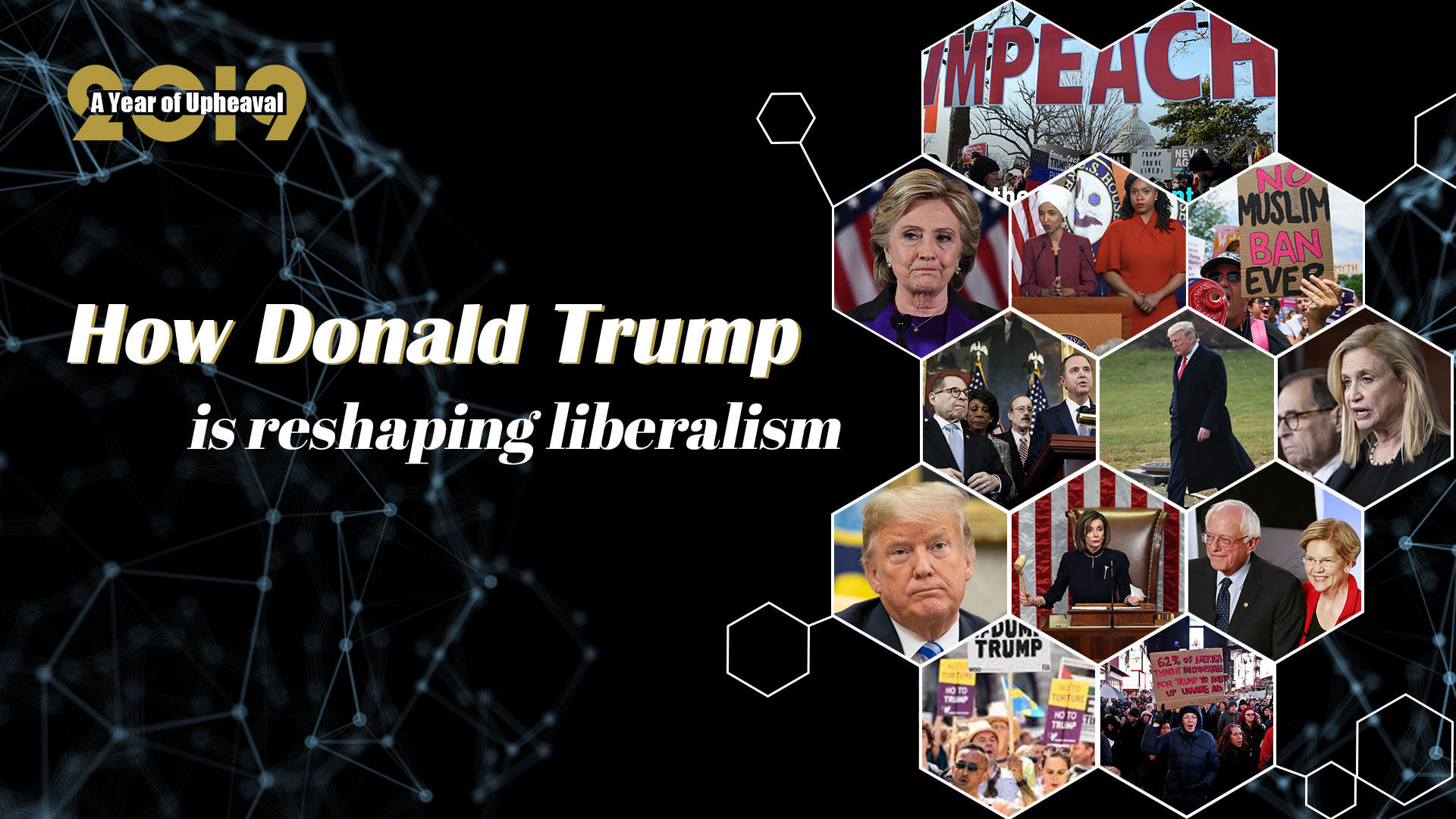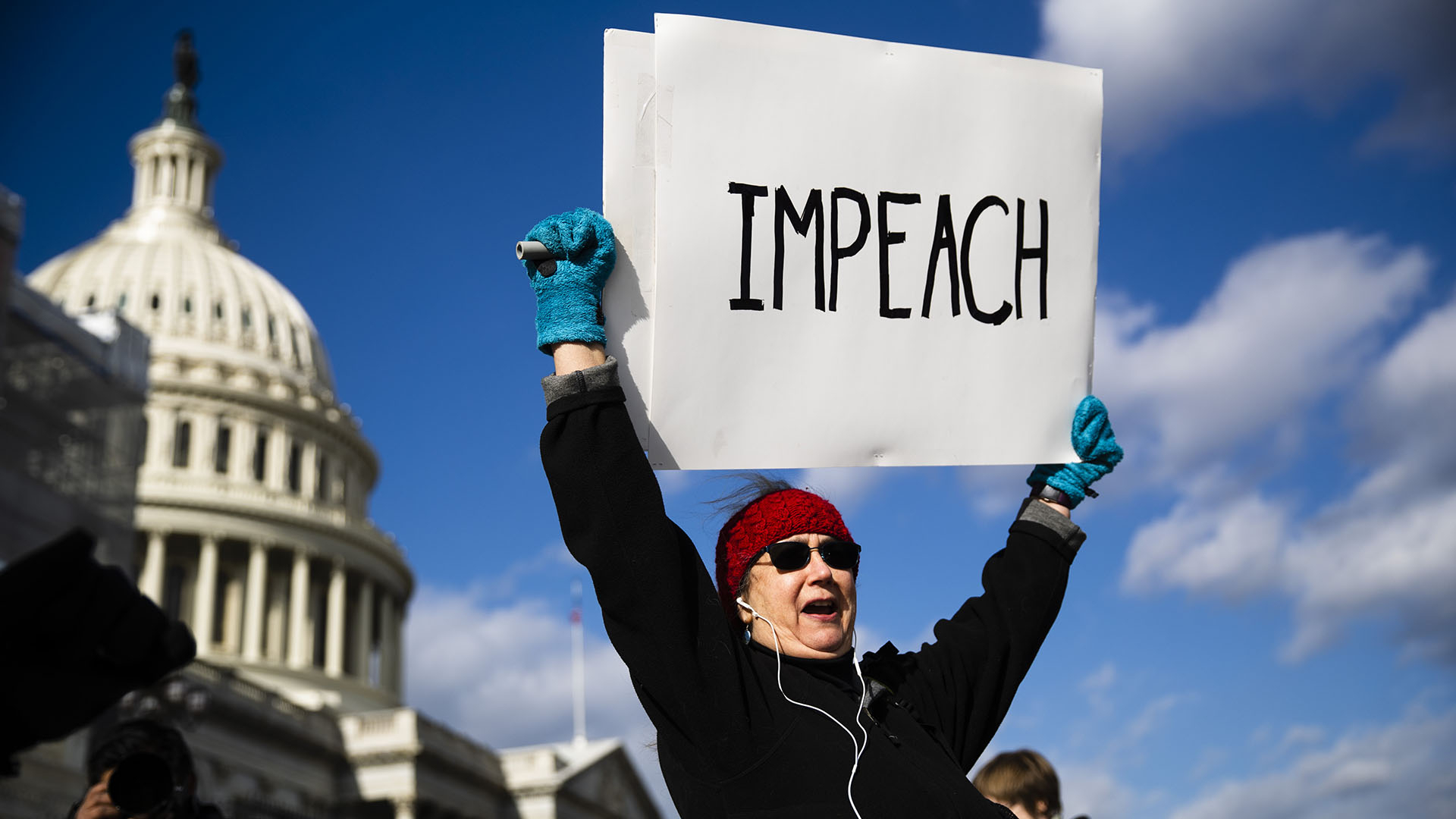
Editor's note: 2019 has been a dramatic year, featuring events that changed the fates of millions around the world. As we move toward 2020, it's time to look back at the past 12 months and reflect on 10 of the most influential topics in China and beyond. Here is the ninth piece in our year-end series: Donald Trump and liberalism. Mike Cormack is a writer, editor and reviewer mostly focusing on China, where he lived during 2007-2014.The article reflects the author's opinions, and not necessarily the views of CGTN.
The effect of President Donald Trump on U.S. domestic politics has been, for good or ill, greater than any politician since Ronald Reagan. Like Reagan he has remade the Republican party largely in his own image. A remarkable statistic is that 40 percent of congressional Republicans in office at the time of Trump's inauguration have been defeated, retired or announced their retirement.
Those staying on have got with the program, such as South Carolina Senator Lindsey Graham, who went from an adamant "Never Trumper" to one of the president's most vocal supporters.
But one of Trump's perhaps less noted achievements is the effect he has had on the Democratic party. In politics as in the physical world, for every action there is an equal and opposite reaction.
And so, as Trump has moved the Republican party to an authoritarian, nepotistic and possibly dynastic cult (given his frequent teasing of remaining beyond his two terms and insertion of his daughter Ivanka into global political conferences), the Democratic party has itself moved and changed.
Where Hillary Clinton ran for the presidency in 2016 on an avowedly centrist platform, the current presidential primary contenders have moved the party distinctly leftwards.
In part this may simply be a bid for primary votes. Democratic voters, angered by Trump's presidency and refusal to behave in the conciliatory way the role demands, want red (or, as it were, blue) meat and candidates must offer something to succor them. So the rhetoric has taken an unusually anti-capitalist bent, with one primary debate focusing on whether billionaires should exist at all.
Also, Bernie Sanders has long been the most overtly left-wing senator, and during both presidential campaigns his influence has pushed the Overton Window (according to which political debate occurs within specific boundaries, which may be shifted according to political and cultural conditions), leaving it now further left than since the 1970s.
But it is more likely that Trump and the modern Republican party have inspired a group of young firebrands to oppose them. These include the four women Trump contemptuously refers to as "the quartet": Congresswomen Ilhan Omar, Rashida Tlaib, Alexandria Ocasio-Cortez and Ayanna Pressley.
Younger than the Democratic establishment, more left-wing, less patient with Wall Street, Silicon Valley and Washington DC, more ideological, and more racially diverse, they show a Democratic party ready to move from its Clintonian centrism to a new radicalism.
What is clear from this dual shift, however, is that U.S. politics is becoming ever more divided. The surprise is only that it has taken the Democrats so long to move from the center. The rhetoric of former Speaker Newt Gingrich, which labeled every Democrat an extremist, and the actions of George W. Bush adviser Karl Rove, which set left against right in a series of "culture wars," left U.S. politicians unable to work with each other for fear of being seen as weak and thus open to a primary challenge from their own party.

Protesters demonstrate as the House of Representatives debates on the articles of impeachment against President Donald Trump at the U.S. Capitol building, Wednesday, December 18, 2019, on Capitol Hill in Washington. /AP Photo
Protesters demonstrate as the House of Representatives debates on the articles of impeachment against President Donald Trump at the U.S. Capitol building, Wednesday, December 18, 2019, on Capitol Hill in Washington. /AP Photo
So Obama's health-care policy, taken in large part from Republican Mitt Romney, was widely decried as socialism, and the formerly collegiate Senate, which had once passed laws on a simple majority, under Senate Leader Mitch McConnell required sixty votes out of a hundred, snarling up the entire governing process.
The reaction from Democrats has been perhaps slow in coming. There were intimations of it during the 2016 primary, when supporters of Bernie Sanders –"Bernie bros"– gained a reputation for stridency and an unwillingness to rally behind Hillary Clinton when she eventually won the nomination. That reluctance, even against a Republican candidate like Trump, was proof of a disinclination to accept the greater political good, as least as accepted by most Democrats.
The question therefore is whether a similar self-righteousness will infect the entire Democratic party. Will it, like the British Labour party under Jeremy Corbyn, seek ideological purity ahead of electoral effectiveness, moral righteousness ahead of the compromises, deals and calculations that election-winning demands? Much will depend on who wins the primary.
Some candidates, like Joe Biden and Andrew Yang, continue to offer centrist and moderate campaigns. (Sorry, say what you want to say about them, but the days of getting the two sides to work together are long gone: Mitch McConnell has blown all of that up). More likely, the winner will be someone like Elizabeth Warren or Bernie Sanders, someone who wants to take the U.S. on an explicitly more liberal path and will be willing to take on the right wing in order to do so.
This likelihood of politics as perpetual warfare is not perhaps what the U.S. needs in the Trump era. A soothing figure in the Gerald Ford model, who adds oil to stormy waters, is almost unimaginable in the present context of partisan division and contempt.
But this environment will continue until politicians who have gained success by this method are scorned by the electorate – though there is little sign of that happening.
The supporters of both parties demand ever stronger contrasts, ever stronger conflict, between them. Liberal America also wants its own satisfactions. In this as in so many ways, Trump will have a more abiding effect on the U.S. than his presidency deserves.
(If you want to contribute and have specific expertise, please contact us at opinions@cgtn.com.)